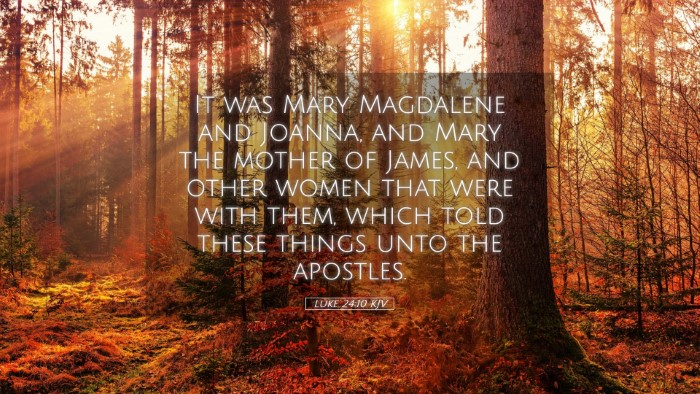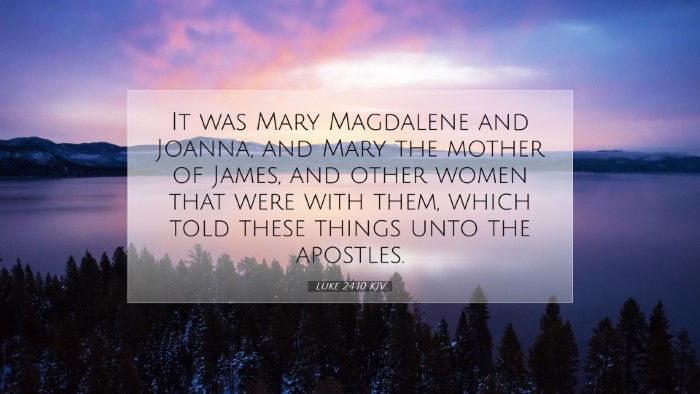Commentary on Luke 24:10
In Luke 24:10, we encounter a pivotal moment following the resurrection of Jesus. The verse states:
"It was Mary Magdalene, Joanna, Mary the mother of James, and the others with them who told this to the apostles."
This moment is rich in theological and narrative significance, which draws the attention of biblical scholars and theologians alike. The commentary provided here integrates insights from several public domain sources to shed light on this influential passage.
Contextual Overview
Luke 24:10 is set within the context of the resurrection, a cornerstone event of Christian faith. Mary Magdalene and other women are the first to witness the empty tomb and communicate this critical news to the apostles. This alignment with the resurrection narrative underscores several themes that are integral to biblical theology.
Role of Women in the Resurrection
One of the striking aspects of this passage is the pivotal role women play in announcing the resurrection. As noted by Matthew Henry, the presence of women as the first witnesses to the resurrection signifies a profound truth regarding God's choice—He often elevates those who were marginalized in society.
Albert Barnes emphasizes that the inclusion of women in this narrative serves to validate their importance in the early church. Their early witness not only challenges social norms but also reinforces the idea that the message of Christ is universal, accessible to all, regardless of gender.
Faithful Witnesses
The women's faithful commitment is further highlighted in Adam Clarke's commentary. He suggests that their deep devotion and loyalty to Jesus positioned them as the first to recognize the implications of the resurrection. This suggests an intimate spiritual insight that God entrusted to them, making them essential bearers of the good news.
Contrast with the Apostles
This contrast between the women's faith and the apostles' initial skepticism is telling. While the women immediately believed the angelic message and acted upon it, the apostles were initially doubtful, as Clarke points out. Their eventual belief is significant as it reflects the transformative power of the resurrection over doubt and despair.
The Message of the Resurrection
The message the women conveyed is profound—it encapsulates not only the resurrection itself but also the promise of hope and renewal. Matthew Henry notes that the phrase "told this to the apostles" illustrates the responsibility placed upon believers to share the gospel. The resurrection event sets the stage for the Great Commission, where the followers of Christ are called to disseminate the message of hope and redemption.
Theological Implications
This passage has important implications for theology. The resurrection affirms the divinity of Christ and His victory over death. As Albert Barnes articulates, the resurrection is a powerful demonstration of God's sovereignty over sin and its consequences—a theme that resonates throughout the New Testament.
Moreover, the choice of women as the initial evangelists reflects the inclusivity of Christ's message. Adam Clarke emphasizes that this action challenges societal constraints, echoing the radical inclusivity of Jesus' ministry, evident throughout the Gospel of Luke.
Application for Believers
For contemporary believers, Luke 24:10 serves as a reminder of the importance of being witnesses to the resurrection in a world that often dismisses the transformative power of faith. The women's role in proclaiming this good news encourages believers to rise above societal norms and boldly share their testimony.
As expressed in the commentaries, the resurrection is not merely a historical event but a present reality that believers are called to proclaim. The early disciples' hesitance contrasts sharply with the women’s faith, urging modern believers to be more attuned to the movements of God in their lives and to approach their witness with conviction.
Conclusion
In conclusion, Luke 24:10 is a powerful testament to the resurrection's central role in Christian faith, showcasing the crucial role women played in this narrative. Through the combined insights of Matthew Henry, Albert Barnes, and Adam Clarke, we glean a deeper understanding of the implications of this scripture for theology, the role of witnesses, and the call to share the Gospel with vigor and faithfulness.
The narrative not only informs historical understanding but also challenges each believer to reflect on their response to the resurrection and encourages them to be active participants in the ongoing story of God's redemption.


